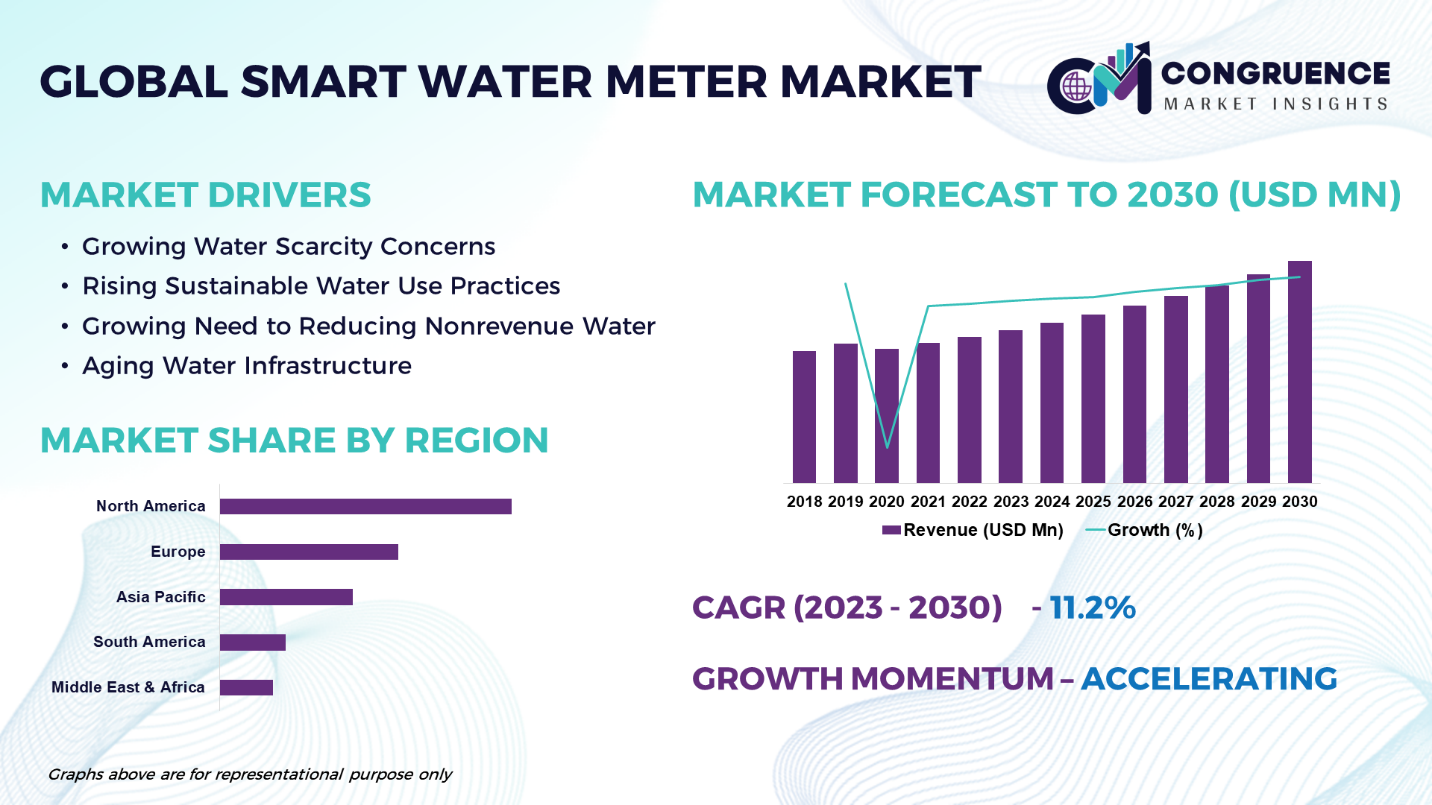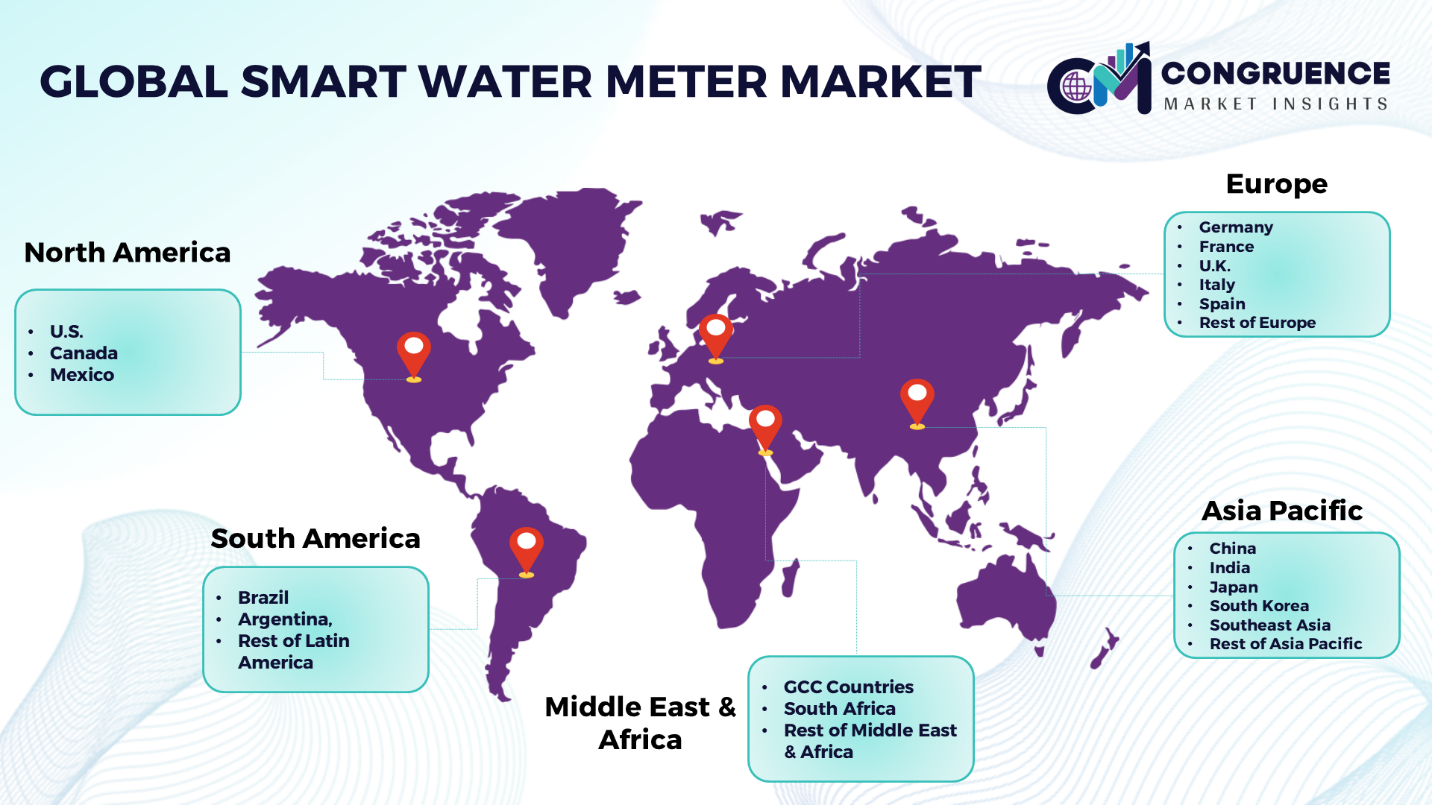Reports
Smart water meters are electronic devices that measures water usage and helps to reduce water loss, such as leaks, throughout the water distribution network. These devices simplify the working of water utilities and are more accurate in their operation as compared to the other alternatives that being used for checking water usage. Utility companies can automatically analyze consumption without manual meter reading. This transparency in the process improves customer satisfaction and helps them to save water. It communicates water usage from consumer to provider to facilitate efficient water management and proper billing. These devices are equipped with an electronic computing unit, that facilitate communication between the meter and the provider. Based on meter type, it can be classified into ultrasonic meters, electromagnetic meters, and electromechanical meters. The market is influenced by factors such as growing water scarcity concerns, rising sustainable water use practices, growing need to reducing nonrevenue water, and aging water infrastructure. The smart water meter market serves residential customers, commercial establishments, and industrial sectors. The Global Smart Water Meter Market is expected to expand at a CAGR of 11.2% between 2023 and 2030.

Smart Water Meter Market Major Driving Forces
Growing Water Scarcity Concerns: The growth of the market is primarily driven by increasing water scarcity creating a need for water management solutions. The increasing concerns about water scarcity and need to reduce water wastage have led to the implementation of water conservation practices.
Rising Sustainable Water Use Practices: The governments across the globe are taking necessary steps to promote sustainable use of water aims to the long-term conservation of water. These steps are being implement after the water demand has risen dramatically in the last decade, due to both heavily growing population and increased urbanization.
Growing Need to Reducing Nonrevenue Water: The rise in utilities focus toward reducing nonrevenue water losses has driven the growth of the global smart water meter market. Water utility companies manage the tasks of the safe and timely distribution of water and other related services. One of the major challenge is nonrevenue water, this has led to a growing focus on water conservation and efficient water management.
Aging Water Infrastructure: Many regions have aging water infrastructure has led to water losses through leaks and insufficient water distribution. Smart water meters help in analyzing and addressing these issues by providing real-time data on water usage and distribution.
Smart Water Meter Market Key Opportunities
Expansion of Smart City: The development of smart cities offers an opportunity for integrating smart water meters into broader urban planning initiatives and projects. Smart water meters are becoming vital part of smart city infrastructures, as it helps to improve water management and efficiency.
Technological Advancements: Opportunities lie in ongoing technological advancements in metering infrastructure. The continuous advancements in sensor technology, communication technologies, and data analytics have made smart water more accurate, reliable, and cost-effective. This led to reduce deployment costs and increase accessibility for several regions.
Integration with IoT: The integration of smart water meters with internet of things(IoT) is anticipated to provide significant opportunities for market growth. With the increasing penetration of advanced systems, the IoT has acquired pace in several industries across the globe. IoT provide valuable data and real-time insights for water utilities.
Smart Water Meter Market Key Trends
· The growing population has surged demand for water in various sectors, this has led to take required steps to reduce water wastage
· Growing need to address the water scarcity as freshwater sources are depleting rapidly due to increasing urbanization is a major trend in the market
· The rise in utilities focus toward a global challenge for reducing nonrevenue water is a significant trend that has driven market growth
· The development of advanced metering infrastructure is gaining traction that aims to enhance metering capabilities
· Growing integration of smart water meters into broader smart city projects that creates interconnected systems for efficient urban management
· Increased use of AI, IoT, and data analytics for advanced data analytics and leak prediction
· The growing use of cloud-based solutions that provide scalability, and accessibility for managing the vast amount of data generated by smart water meters is a notable trend

Market Competition Landscape
The global smart water meter market is highly fragmented with the presence of established and emerging players. Their dominance can be attributed to the diversified product portfolio of smart water meters along with continuous innovations leading to development of new devices. Key players in the smart water meter market adopting various strategies aimed at gaining a competitive edge. These strategies include product innovation, design differentiation, and the incorporation of innovative technologies to meet evolving consumer preferences. Established brands leverage their reputation for quality and reliability to maintain market share, while newer entrants focus on disruptive innovations and unique selling propositions.
Key players in the global smart water meter market implement various organic and inorganic strategies to strengthen and improve their market positioning. Prominent players in the market include:
· Badger Meter, Inc.
· Sensus
· Diehl Stiftung & Co. KG
· Aclara Technologies LLC
· The White Company
· Itron, Inc.
· Arad Group
· Kamstrup A/S
· Landis+Gyr Group AG
· Mueller Water Product Inc.
· Honeywell International Inc.
· Axioma Metering
· Suntront tech Co., Ltd.
· Elster Group GmbH
|
Report Attribute/Metric |
Details |
|
Base Year |
2022 |
|
Forecast Period |
2023 – 2030 |
|
Historical Data |
2018 to 2022 |
|
Forecast Unit |
Value (US$ Mn) |
|
Key Report Deliverable |
Revenue Forecast, Growth Trends, Market Dynamics, Segmental Overview, Regional and Country-wise Analysis, Competition Landscape |
|
Segments Covered |
· By Type (Automatic Meter Reader, and Advanced Metering Infrastructure) · By Component (Hardware, Software, and Services) · By Meter Type (Ultrasonic Meters, Electromagnetic Meters, and Electromechanical Meters) · By Application (Residential, Commercial, and Industrial) |
|
Geographies Covered |
North America: U.S., Canada and Mexico Europe: Germany, France, U.K., Italy, Spain, and Rest of Europe Asia Pacific: China, India, Japan, South Korea, Southeast Asia, and Rest of Asia Pacific South America: Brazil, Argentina, and Rest of Latin America Middle East & Africa: GCC Countries, South Africa, and Rest of Middle East & Africa |
|
Key Players Analyzed |
Badger Meter, Inc., Sensus,Diehl Stiftung & Co. KG,Aclara Technologies LLC,Itron, Inc.,Arad Group,Kamstrup A/S,Landis+Gyr Group AG,Mueller Water Product Inc.,Honeywell International Inc.,Axioma Metering,Suntront tech Co., Ltd., and Elster Group GmbH |
|
Customization & Pricing |
Available on Request (10% Customization is Free) |
